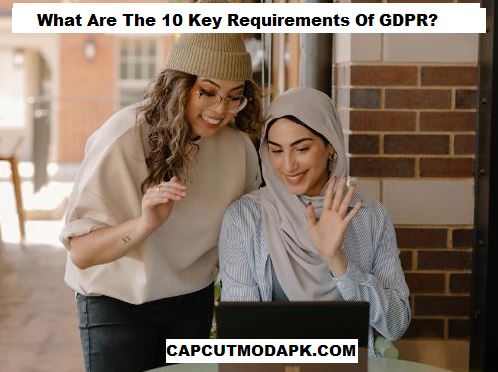Small businesses today face many challenges in ensuring compliance with privacy laws. One of the most important regulations is the General Data Protection Regulation (GDPR). This regulation, introduced by the European Union, applies to any business that handles personal data of EU residents. For small businesses, navigating GDPR compliance can be daunting. However, with the right approach, it is possible to ensure that your business meets the necessary requirements without overwhelming your resources.
GDPR compliance isn’t just for large corporations. Even small businesses that only collect basic customer information need to adhere to GDPR. Failing to comply can lead to significant fines, reputational damage, and loss of trust. However, the good news is that small businesses can take steps to comply with GDPR requirements. It’s not about having a huge budget or complex systems. It’s about understanding your responsibilities and taking manageable steps to protect customer data.
This article will guide you through the essential steps to ensure GDPR compliance for your small business. You will learn about key GDPR requirements, practical checklists, and basic principles that will help you navigate the process. Whether you’re just starting or reviewing your current policies, this guide will provide you with everything you need to stay compliant.
How To Comply With GDPR For Small Business?
Complying with GDPR for a small business starts with understanding what personal data you collect and how you process it. Personal data refers to any information that can identify an individual, like names, emails, and phone numbers. Even IP addresses and cookies can count as personal data under GDPR. The first step in compliance is conducting an audit of the data you collect. Review every aspect of your business operations to identify where and how personal data is collected, stored, and used.
Once you have a clear understanding of the data you handle, the next step is ensuring you have proper consent from individuals to use their data. This means being transparent about how their data will be used and asking for explicit permission. GDPR emphasizes consent, and businesses must be able to prove that they’ve obtained it. If you’re using personal data in a way that people didn’t explicitly agree to, you may be in violation of the law.
Finally, small businesses need to implement adequate security measures to protect the data they collect. Data breaches can happen if your business doesn’t take security seriously. You don’t need expensive software or IT experts to secure data. Start by using strong passwords, encrypting sensitive information, and educating your employees about best practices for data security.
How Do You Ensure GDPR Compliance?
Ensuring GDPR compliance is about creating a culture of privacy and data protection within your business. Start by appointing someone to be responsible for data privacy. This doesn’t have to be a full-time position, but you need someone to oversee GDPR efforts. This person should ensure that data protection is integrated into your business practices and make sure staff are properly trained on privacy matters.
Another key step is developing clear data protection policies. These policies should outline how you handle personal data, how long you store it, and how individuals can request to have their data removed. You should also ensure that your privacy policy is up to date and clearly explains your practices. Make sure customers can easily understand how their data is being used and what rights they have.
One of the most important ways to ensure compliance is by keeping track of data access and processing activities. This means keeping a record of who has access to personal data, how it’s being used, and ensuring that only authorized individuals handle sensitive information. Regularly reviewing and updating these records is essential to maintaining GDPR compliance.
What Are The 7 GDPR Requirements?
The GDPR outlines seven key requirements that businesses must adhere to in order to ensure compliance. These include:
Lawful Basis for Processing
You must have a valid reason to process personal data, whether it’s consent, a contractual obligation, or legitimate interests.
Data Minimization
Only collect and process the minimum amount of personal data necessary for your purpose.
Transparency
Inform individuals about how their data is being used through clear and accessible privacy notices.
Accuracy
Ensure that personal data is accurate and kept up to date. You should have processes in place to rectify any inaccuracies.
Storage Limitation
Keep personal data only as long as necessary. Once it’s no longer needed, it should be securely deleted or anonymized.
By adhering to these seven principles, small businesses can ensure they stay on the right side of the law and avoid hefty fines.
What Is The Minimum Size For Companies To Comply With GDPR?
One common misconception is that GDPR applies only to large companies. In reality, it applies to any business that processes the personal data of individuals within the European Union, regardless of size. Whether you’re a solo entrepreneur or a small business with a handful of employees, you are required to comply with GDPR if you handle personal data of EU residents.
However, there are certain conditions where smaller businesses may have less stringent requirements. For example, businesses with fewer than 250 employees are not required to maintain detailed records of data processing activities unless the data processing is likely to impact the rights and freedoms of individuals. Additionally, some small businesses may not need to appoint a Data Protection Officer (DPO) unless they engage in certain types of data processing.
In essence, if your business collects, stores, or processes the personal data of EU citizens, you need to comply with GDPR, regardless of your company’s size.
What Is The GDPR Checklist For A Business?
Having a GDPR compliance checklist can help ensure that your small business meets all the necessary requirements. Here’s a basic checklist to get you started:
- Audit Data – Identify what personal data you collect, how it’s used, and where it’s stored.
- Review Consent – Make sure you have explicit consent from individuals to process their data.
- Update Privacy Policies – Ensure that your privacy policies are clear, accessible, and up-to-date.
- Implement Security Measures – Use encryption, strong passwords, and regular security audits to protect personal data.
- Train Employees – Educate staff about their responsibilities under GDPR, especially those who handle personal data.
- Monitor Data Breaches – Set up procedures for detecting and reporting data breaches.
- Ensure Data Subject Rights – Make sure individuals can exercise their rights under GDPR, such as access, correction, and deletion of their data.
By following this checklist, your business can stay on track with GDPR compliance.
What Are The 10 Key Requirements Of GDPR?

The 10 key requirements of GDPR are:
- Lawful Processing
Personal data must be processed lawfully, fairly, and transparently. - Purpose Limitation
Personal data must only be collected for specified, legitimate purposes. - Data Minimization
Only collect data necessary for the specific purpose. - Accuracy
Ensure that personal data is accurate and up-to-date. - Storage Limitation
Personal data must not be kept for longer than necessary. - Integrity and Confidentiality
Implement appropriate security measures to protect personal data. - Accountability
Ensure that your business can demonstrate compliance with GDPR. - Data Subject Rights
Provide individuals with the right to access, correct, delete, and transfer their data. - Data Protection by Design and by Default
Incorporate data protection measures into your business practices from the start. - Data Breach Notification
Notify the relevant authorities and affected individuals if a data breach occurs.
These requirements ensure that businesses respect individuals’ privacy and handle personal data responsibly.
What Are The Basic Principles To Ensure GDPR Compliance For It?
The basic principles of GDPR compliance revolve around protecting the privacy and rights of individuals. First, businesses must be transparent about their data processing activities. This means clearly explaining what data you collect, how it’s used, and how individuals can control their data.
Another core principle is data minimization. Only collect data that is necessary for your business operations. Avoid storing excessive amounts of personal information and ensure that it is only kept as long as needed. Also, implementing proper security measures to safeguard this data is essential. Encryption, strong password protocols, and access control are crucial steps in preventing data breaches.
Finally, businesses must uphold individuals’ rights under GDPR. This includes the right to access, correct, and delete their personal data. Regularly review your policies and processes to ensure they are up to date and aligned with GDPR standards.
How To Check GDPR Compliance?
To check your GDPR compliance, start by conducting an internal audit. Review all the personal data your business collects and ensure that you are following GDPR principles. Check your privacy policies to make sure they are transparent and clearly explain how you process data.
Next, assess your security measures. Are your systems secure enough to protect personal data from breaches? Do you have protocols in place for reporting breaches if they occur?
Finally, ensure that your staff understands GDPR requirements. Regular training is necessary to maintain compliance, especially as regulations and business operations change over time.
What Does The GDPR Legally Require?
GDPR legally requires businesses to protect the personal data of individuals within the EU. This includes ensuring that data is processed fairly, stored securely, and used only for specific purposes. Businesses must obtain explicit consent before processing personal data, and individuals have the right to request access to, correction of, or deletion of their data.
Additionally, businesses must report data breaches within 72 hours if the breach risks the rights and freedoms of individuals. They must also implement appropriate technical and organizational measures to protect personal data.
In conclusion, GDPR compliance is a serious responsibility, but with the right steps, small businesses can meet the requirements and avoid penalties.


